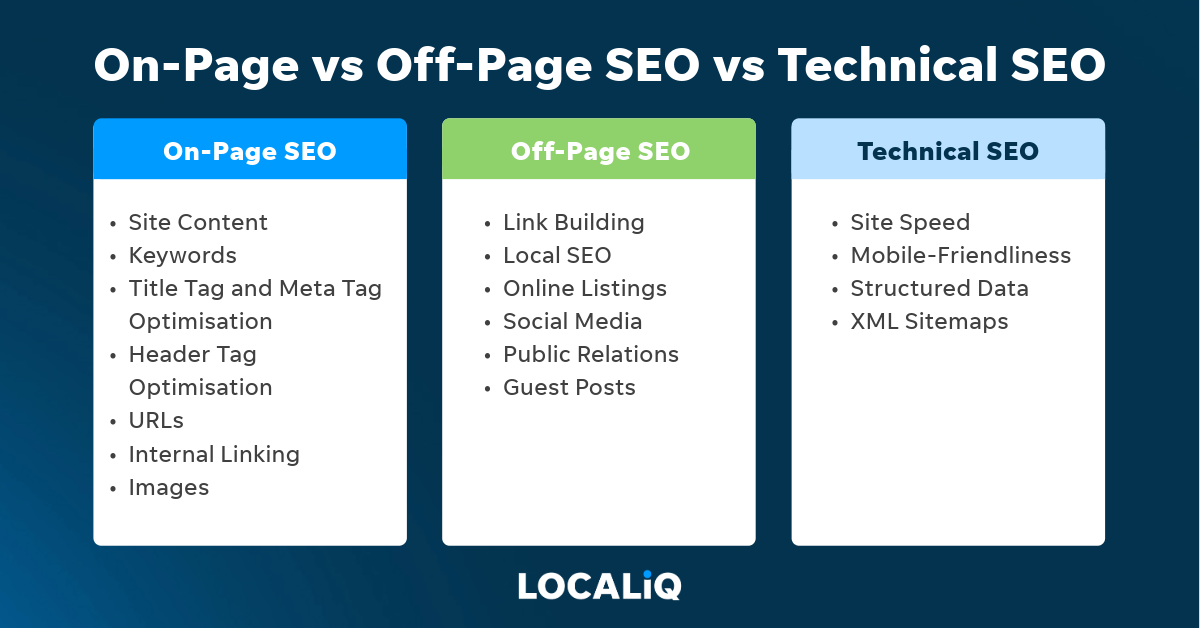If you’re familiar with SEO, you’ve likely already hear of the term “off-page SEO”, but what is it? and why does your business need it? Let’s break it down.
This blog will cover:
- What is off-page SEO?
- Why is off-page SEO important?
- How Does off-page SEO work?
- How to get started with off-page SEO
What is off-page SEO?
Off-page SEO refers to all the activities you do away from your website to raise the search ranking of your web pages. The logic behind this is that the more your website is referred to by other sites, the more trustworthy and high-quality your content must be. The most common and influential off-page SEO activities are earning high-quality backlinks, creating guest blogs for other websites, managing online listings and utilising social media for engagement.

Why is it Important for businesses?
Search engines like Google use complex algorithms to determine the relevance and authority of a website. Off-page SEO, especially backlinks from reputable sites, significantly impacts these algorithms. Higher search-rankings mean more visibility (and more website traffic) for your business.
Earning backlinks or mentions from reputable sites, can signal to both search engines and users that your business is trustworthy and credible. Helping your business to build brand-trust and to also appear higher on the search results pages.
How does off-page SEO work?
Search engine bots crawl your web pages to determine how well they should rank, but they also take into account off-page activity such as:
- Links to your site
- Social media activity
- Listings (including reviews)
They want to see how ‘active’ a company is online, as well as how authoritative and trustworthy it is. In general, the more active a company is, the better it will do in terms of website visibility.
How to get started with off-page SEO
Here are some key off-page SEO techniques you can utilise to improve your off-page SEO strategy:
1. Gaining backlinks
The cornerstone of off-page SEO. Backlinks from high-quality, relevant websites signal to search engines that your content is valuable and trustworthy. Here are a few ways you can get more backlinks:
Create high-quality content
To earn backlinks, you will first need to create high-quality content that websites can link to.
Start by thoroughly researching your audience to understand their pain points, interests, and needs using tools like surveys, social media insights, and keyword research. This information will help you craft content that provides genuine value, making it more likely to be shared. Focus on producing well-researched, well-written content that offers unique insights or solutions. Enhance your content with a mix of text, high-quality images, and videos to make it visually appealing and engaging.
Guest posting
Guest blogging (or guest posting) involves writing blog posts or articles that are published on another business’s site or another person’s blog. This can be useful for a number of reasons, mainly because it builds relationships, trust, exposure and links. The practice of guest blogging is becoming increasingly common, most likely because it’s a helpful and more ethical way to provide your site with more authority and backlinks.
If you’re considering guest blogging as a method of off-page SEO, there are several factors to think about:
- What’s your goal?
- Who are you going to guest blog for?
- How are you going to pitch your guest post?
- How are you going to write your post?
- How are you going to track responses?
Each of these questions need to be answered in order to create the best opportunities for guest blogging. Extensive research should be conducted to discover which blogging sites would be best to pitch a guest post idea to, and to understand the topics and structures of posts that should be considered.
Broken link building
Identify broken links on relevant websites and suggest your content as a replacement. This benefits both you and the website owner.
Remember: you should always focus on quality over quantity. A few high-quality backlinks from relevant websites are far more valuable than numerous backlinks from low-quality sources.
You should also avoid black-hat SEO tactics like buying links or link schemes. These tactics can harm your website and lead to penalties from search engines.
2. Brand building & brand mentions
Digital Public Relations (PR)
Digital PR is a strategic approach to enhancing a brand’s online presence and reputation through various digital channels. Unlike traditional PR, which focuses on offline media like newspapers, magazines, and television, digital PR leverages the power of the internet to reach a wider and more targeted audience.
The primary goal of digital PR is to increase a brand’s visibility and credibility online. This is achieved by creating and distributing high-quality content, securing backlinks from reputable websites, and engaging with audiences through social media platforms.
Effective digital PR begins with developing compelling stories that are relevant, timely, and interesting to your target audience and the media. Focus on unique angles or insights that set your brand apart. This approach ensures your content stands out in a crowded digital landscape.
To create an effective digital PR strategy, you will need to be able to build genuine relationships with journalists/bloggers.
Start by identifying key influencers in your industry who have a significant reach and credibility. Establish and nurture connections with these individuals by engaging with their content, commenting on their posts, and sharing their work. Show genuine interest in their topics and perspectives to build a rapport.
When reaching out, personalise your communication. Tailor your messages to highlight how your story or content aligns with their own audience’s interests. Demonstrate that you understand their work and how your contribution can add value to their readership. Avoid generic pitches; instead, provide specific reasons why your content would be relevant and beneficial to their audience.
If journalists and bloggers feature your content, it often includes backlinks to your website, which is beneficial for your SEO efforts. Effective PR efforts can thus generate positive online press coverage, driving traffic to your site and improving your search engine rankings. Building these relationships takes time and effort, but the long-term benefits for your brand’s online presence are substantial.
Interested in how digital PR could benefit your business? Take a look at our Digital PR Link Building Service to find out how we can help you boost your online visibility.
Social media marketing
Social media can be used to increase your content’s visibility and reach. Sharing content on platforms like Meta/Facebook, X, and LinkedIn exposes it to a larger audience, with the chance of potentially driving traffic to your website. This increased traffic signals to search engines that your site is valuable. This can positively impacting your search rankings. Engagement such as likes, shares, and comments will also enhance your brand’s credibility and authority, making it more appealing to search engines.
Social media helps to facilitate the acquisition of high-quality backlinks. When your content is shared and discussed, it attracts the attention of bloggers and industry professionals who may link back to your website. These backlinks can be valuable endorsements if they come from reputable websites, improving your site’s authority and relevance in search engines’ eyes.
Online reviews & reputation management
Online reviews and reputation management involve monitoring, influencing, and controlling your business’s reputation across various online platforms. This includes encouraging positive customer reviews, addressing negative feedback, and maintaining a consistent and personable online presence. These efforts are beneficial to your business for a variety of reasons, particularly when it comes to off-page SEO.
Encouraging reviews on platforms like Google Business Profile, Yelp, and industry-specific review sites signal to search engines that your business is trustworthy and valued by customers. Search engines consider this user-generated content when determining your website’s relevance and authority, which can improve your rankings in local search results. High ratings and positive reviews can also attract more clicks and traffic to your website, enhancing your overall online presence.
Responding promptly and professionally to negative reviews demonstrates that you value customer feedback and are committed to improving their experience. This can mitigate the damage of negative comments and potentially convert dissatisfied customers into loyal ones. Moreover, a proactive approach to managing your online reputation can prevent small issues from escalating into more significant problems that could harm your brand’s image.
3. Other techniques
Online directories & listings
Online directories and listings are websites where businesses can register their details, such as their name, address, phone number (NAP), and website URL. Examples include Google Business Profile, Yelp, Bing Places, and industry-specific directories. These directories help users find businesses and services within specific categories and locations, enhancing a business’s online presence.
When your business appears in multiple reputable directories with consistent NAP information, search engines view it as reliable and relevant, which can boost your local search rankings. Additionally, being listed in various directories increases the chances of your business being discovered by potential customers, ensuring you reach a broader audience.
Many directories also provide backlinks to your website, however, it’s important to remember that these links won’t carry as much weight in terms of authoritativeness compared with a more reputable site. Instead, it’s more recommended to view them as a place to encourage website traffic and trust.
Forums & online communities
Forums and online communities are platforms where individuals gather to discuss topics of mutual interest, share knowledge, and seek advice. These can include general forums like Reddit and Quora, or niche-specific communities dedicated to particular industries, hobbies, or issues. Businesses can participate in these forums by providing valuable insights, answering questions, and engaging in discussions relevant to their field.
These online platforms are important for off-page SEO because they help build your brand’s authority and credibility. By actively participating and offering expert advice, you establish yourself as a knowledgeable figure in your industry. This not only enhances your reputation but also encourages other members to visit your website for more information, driving referral traffic. Such engagement demonstrates to search engines that your site is relevant and authoritative, which can positively impact your search engine rankings.
Forums and online communities also often allow users to include links in their posts or signatures. When you provide helpful content and include a link to your website, it can lead to high-quality backlinks. These backlinks are valuable for SEO as they signal to search engines that your site is a trusted source of information. However, it’s crucial to avoid spamming and to ensure that any links shared are genuinely helpful and relevant to the discussion.
Additionally, these platforms offer valuable insights into your target audience’s interests, pain points, and frequently asked questions. By understanding what your audience is discussing, you can tailor your content strategy to address their needs more effectively. This can lead to higher engagement and more shares, further boosting your off-page SEO efforts. In summary, active participation in forums and online communities enhances your online presence, builds credibility, drives traffic, and generates valuable backlinks, making it a vital component of an effective off-page SEO strategy.
Useful metrics to help measure off-page SEO performance
There are a number of useful metrics you can use to help measure off-page SEO success, some of which can be used for both off-page and on-page SEO methods. Depending on your goals, some may be more relevant than others:
- Website traffic
- Social engagements
- Link clicks
- Conversions
- Domain and page authority scores
- Quantity of links
Some, if not all of these measurement factors should help towards understanding where you are in achieving your aims. However, please remember that it can take up to six-months for Google and other search engines to index and rank your website, so it may be best to measure the success of your tactics up to a year after you’ve implemented them.
Website traffic
Website traffic simply refers to the number of people that visit your site. Analytics tools such as Google Analytics (which is free!) can help you understand the number of people that visit a specific page daily, monthly, yearly, etc. If you compare the traffic prior to conducting off-page SEO activities with the traffic after, there should be a positive difference.
Social engagements
Social engagements involve the number of people that are interacting with your posts on social media, or with your guest blogs (if you decided to create them). In terms of where to find these metrics, each social media site you own a page for, should have these analytics housed for you. In terms of guest blogs, the website you blogged for should offer you the data after a month or so, or whenever you ask for it (this is something you should confirm before offering a blog post though).
Link clicks
As well as offering data about website traffic, Google Analytics and other sites can also offer information regarding which link people have clicked to lead them to your website. This includes whether it was an advert, a social media link, or through an organic link through a search. Understanding the most popular ways people have landed on your website will give you an indication of the types of areas you might want to consider including future backlinks. For example, if you’ve received the majority of click-throughs from your guest blog, you may want to consider writing more for similar sites.
Conversions
If you’ve decided to conduct off-page SEO tactics for a specific page in the hopes of getting potential customers to download a piece of content or request a call back, then the number of conversions you’ve received is probably a good indicator of how well our off-page SEO tactics have worked. If conversions have increased since implementing off-page SEO, then chances are it’s working.
Domain and page authority
Your domain and page authority should increase if your off-page SEO activities have been successful. If these numbers have increased somewhat substantially, then the likelihood is your website has moved up in its ranking. You should also compare these numbers with your competitors before and after conducting off-site SEO, but it may be a case that they’ve upped their game too.
Quantity of links
The number of links that point to your website will give an indication of how well your website is likely to rank. Whilst the more backlinks the better, this is only the case if those links are high-quality from authoritative and trustworthy sites themselves. It’s important to review these backlinks every so often to ensure they’re still featured on active and trusting websites.
If you’re not seeing a positive difference from any of the metrics above, then there may be an issue, this can include too many low-quality or forced backlinks, having too few backlinks, or you’re simply being out-marketed by your competition. Everything can be adapted though, which is one of the reasons to measure how well your off-page SEO is doing, as it gives you the chance to regroup and refresh.
Did you know that LOCALiQ has a team of award-winning SEO experts? If you want to explore implementing off-page SEO then get in touch with us today.





